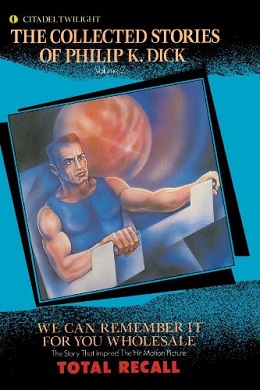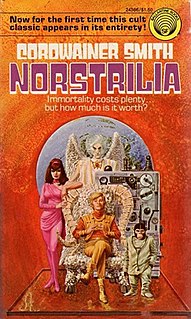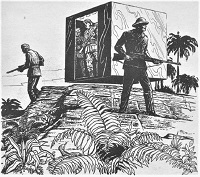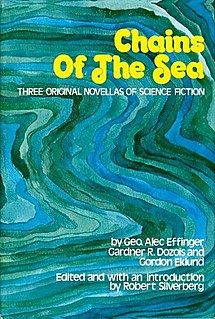Plot summary
Bo Steaffler, a young US Army corporal, is participating in the 1944 D-Day landings. Shortly after he hits the beach, he is killed by an explosion. However, he awakes to find himself uninjured and imprisoned in a dark dank cell. He is confronted by a strange creature with hypnotically luminous eyes, identified only as 'Aensa'. The creature communicates telepathically with him, questioning Steaffler as to the weapons and strategies used in the landings, but he's only a corporal and doesn't know much.
The Aensa sends him back to the beaches and when he is again killed, recovers him again. Steaffler, a pulp science fiction enthusiast, eventually realises that the creature is part of a potential invasion of Earth and seeks information on its defences. He projects telepathic visions of all the crazy weapons he has read about in magazines and creates a galaxy-wide scenario for the war.
The Aensa is more and more concerned that Earth may not be ready for invasion, and flings Steaffler back into his own time and place. He is again - finally - killed and as his thoughts fade, he remembers only "We won".

Dragonflight is a science fiction novel by the American-Irish author Anne McCaffrey. It is the first book in the Dragonriders of Pern series. Dragonflight was first published by Ballantine Books in July 1968. It is a fix-up of novellas, including two which made McCaffrey the first woman writer to win a Hugo and Nebula Award.
George Alec Effinger was an American science fiction author, born in Cleveland, Ohio.

"We Can Remember It for You Wholesale" is a short story by American writer Philip K. Dick, first published in The Magazine of Fantasy & Science Fiction in April 1966. It features a melding of reality, false memory, and real memory. The story was adapted into the 1990 film Total Recall with Arnold Schwarzenegger as the story's protagonist; that film was remade in 2012 with Colin Farrell as the protagonist.

World at the End of Time is a 1990 hard science fiction novel by American writer Frederik Pohl. It tells the parallel stories of a human and a plasma-based intelligence who manage to survive to the time near the heat death of the universe. The book is thus a combined work in speculative cosmology and space colonization.

"Call Me Joe" is a science fiction novelette by American writer Poul Anderson, published in Astounding Science Fiction in April 1957. It later appeared in Anderson's 1981 collection The Dark Between the Stars. The Science Fiction Writers of America selected "Call Me Joe" for The Science Fiction Hall of Fame, Volume Two.

Norstrilia is a science fiction novel published by Paul Linebarger under the pseudonym Cordwainer Smith. It is the only novel he published under this name, which he used for his science fiction works. It takes place in Smith's Instrumentality of Mankind universe, and was heavily influenced by the classic Chinese novel Journey to the West. The novel is in part a sequel to Smith's 1962 short story "The Ballad of Lost C'Mell", featuring some of the same characters and settings.

The Zap Gun is a 1967 science fiction novel by American author Philip K. Dick. It was written in 1964 and first published under the title Project Plowshare as a serial in the November 1965 and January 1966 issues of Worlds of Tomorrow magazine.
"Knock", is a science fiction short story by American writer by Fredric Brown. It starts with a short-short story based on the following text of Thomas Bailey Aldrich:
IMAGINE all human beings swept off the face of the earth, excepting one man. Imagine this man in some vast city, New York or London. Imagine him on the third or fourth day of his solitude sitting in a house and hearing a ring at the door-bell!

"Green Patches" is a science fiction short story by American writer Isaac Asimov. It was first published in the November 1950 issue of Galaxy Science Fiction under the title "Misbegotten Missionary", and reprinted under that title in the 1952 anthology Tomorrow, the Stars. It was retitled "Green Patches" in Asimov's 1969 collection Nightfall and Other Stories.

Legacy of the Daleks is an original novel written by John Peel and based on the long-running British science fiction television series Doctor Who. It features the Eighth Doctor, Susan, the Master - as the Roger Delgado incarnation - and the Daleks.

The Face-Eater is an original novel written by Simon Messingham and based on the long-running British science fiction television series Doctor Who. It features the Eighth Doctor and Sam.
"Impostor" is a science fiction short story by American writer Philip K. Dick. It was first published in Astounding SF magazine in June, 1953.

The Night of Kadar is a science fiction novel by British writer Garry Kilworth, published in 1978.
"The Message" is a science fiction short story by American writer Isaac Asimov. It was first published in the February 1956 issue of The Magazine of Fantasy and Science Fiction and reprinted in the 1957 collection Earth Is Room Enough. "The Message" provides a fanciful origin of the expression "Kilroy was here". A very short story, it contains only 579 words.

Maureen Birnbaum, Barbarian Swordsperson is a 1993 anthology by George Alec Effinger, collecting all of his stories about Maureen "Muffy" Birnbaum, a Jewish-American Princess who is magically teleported to various fantasy and science fiction universes, and later recounts the tales to her best friend, "Bitsy" Spiegelman. Originally written on his own initiative, the character proved popular enough for Effinger to gain several requests from authors to have versions of their work visited by Muffy.

"A Gun for Dinosaur" is a time travel science fiction story by American writer L. Sprague de Camp as part of his Rivers of Time series. It tells the story of four men who travel into the past to hunt dinosaurs.

"Mars Is Heaven!" is a science fiction short story by American writer Ray Bradbury, originally published in 1948 in Planet Stories. "Mars Is Heaven!" was among the stories selected in 1970 by the Science Fiction Writers of America as one of the best science fiction short stories published before the creation of the Nebula Awards. As such, it was published in The Science Fiction Hall of Fame Volume One, 1929–1964. It also appears as the sixth chapter of The Martian Chronicles, revised as "The Third Expedition."

"The Handicapped" is a science fiction short story by Larry Niven, originally published in the December 1967 issue of Galaxy Science Fiction as "Handicap". Set in the Known Space universe, the story introduces the Grogs, the sessile but sentient inhabitants of the planet Down.
The Canopy of Time is a science fiction novel by English writer Brian W. Aldiss, first published in 1959 by Faber and Faber. The story is a fix-up of previously published short stories, centering on the forty-million year history of the fictional city of New Union. The book was published in the United States as Galaxies Like Grains of Sand.

Chains of the Sea is a 1973 anthology of three science-fiction novellas: "And Us, Too, I Guess" by George Alec Effinger, "Chains of the Sea" by Gardner Dozois, and "The Shrine of Sebastian" by Gordon Eklund, with an introduction by Robert Silverberg.















